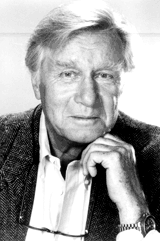- - - -
"DON'T MOVE,
DIRTBAG!"
A FANTASTIC
JOURNEY
THROUGH THE
WORLD OF
"POLICE
ACADEMY",
PART ONE:
"POLICE
ACADEMY"
BY DAVID BLUMENSTEIN
April 21, 2003
- - - -
"Excuse me, sir. I seem to have ripped my pants."
-- Cadet Carey Mahoney
"I'm going to make you hate me for the rest of
your lives."
-- Lieutenant Thaddeus Harris
 Quite
possibly it has been years since you've watched that cinematic gem
of 1984 known as Police Academy. No doubt it's been almost as long
since you've watched its 1985 follow-up, Police Academy II: Their
First Assignment. Probably you've seen most of Police Academy III:
Back In Training (1986), the David Spade parts of Police Academy IV:
Citizens On Patrol (1987), you remember that Police Academy V: Assignment
Miami Beach (1988) was set in Miami Beach, you're not sure if there
was a Police Academy VI (there was), and you're almost certain there
was no Police Academy VII (there was).
Quite
possibly it has been years since you've watched that cinematic gem
of 1984 known as Police Academy. No doubt it's been almost as long
since you've watched its 1985 follow-up, Police Academy II: Their
First Assignment. Probably you've seen most of Police Academy III:
Back In Training (1986), the David Spade parts of Police Academy IV:
Citizens On Patrol (1987), you remember that Police Academy V: Assignment
Miami Beach (1988) was set in Miami Beach, you're not sure if there
was a Police Academy VI (there was), and you're almost certain there
was no Police Academy VII (there was).
I have long been a fan of the Police Academy movies,
as they were most likely the movies I watched the most of as a child
(there being so many of them, and all recorded off TV at our house).
Many malign the Police Academy series, sometimes with good reason,
occasionally in a highly humorous way. The Simpsons, in particular,
has leveled a few funny shots (Homer: "Why do you think I took
you to all those Police Academy movies? For fun? Well, I didn't hear
anybody laughing. Did you?").
Nevertheless, there is much to be admired about the
Police Academy films -- their consistency, for one thing. One always
knows what to expect when they hit the couch for a trip to the Academy:
a roller-coaster ride of slapstick, off-colour jokes and wacky set
pieces, performed by a memorable cast of characters: the gung-ho army
freak, the timid woman, the accident-prone geek, the busty disciplinarian,
the gentle giant, the scheming bastard, the borderline-senile authority
figure, the guy who makes funny noises and, of course, the devilishly
handsome smartass. You know that, in the course of the following ninety
minutes or so, cops will wreck things, somebody will get fooled by
a weird noise from out of nowhere, somebody will stumble mistakenly
into a gay bar, the bad guys will lose, the good guys will win, and
Steve Guttenberg will score some tail.
Do you think the people behind Police Academy expected
the action/slapstick/T & A cop flick to earn US$81 million (a
sweet take even in today's money) and to spawn six celluloid sequels,
animated and live action TV series, and a beloved stunt show at Warner
Brothers Movie World? I doubt it. Police Academy, I would imagine,
was an unexpected cash cow of which the producer, Paul Maslansky,
took full advantage. Maslansky, who produced the first US/USSR co-production,
The Blue Bird (1976), spent virtually all of the 1980s producing nothing
but Police Academy movies, taking only one break in 1985 to produce
Return To Oz, an adaptation of L. Frank Baum's Wizard Of Oz series
of books which starred a young Fairuza Balk (the movie, not the books).
Police Academy was written by Neal Israel and Pat Proft.
Pat Proft co-wrote the famed Star Wars Holiday Special (profiled in
a previous issue of SBIG), but can be forgiven for this, as the former
stand-up comedian fell in with professional nutbags Zucker, Abrahams
& Zucker and, together with them, was responsible for the Police
Squad! TV series (starring Leslie Nielsen as bumbling cop Frank Drebin),
the Naked Gun series and also the Hot Shots! films. Neal Israel's
major written works, post-Police Academy, have been Police Academy
2, Look Who's Talking Too, Surf Ninjas and a pair of direct-to-video
mysteries starring Mary-Kate and Ashley Olsen, of Full House fame.
Together, the pair also co-wrote Bachelor Party (1984, Tom Hanks),
Real Genius (1985, Val Kilmer) and Moving Violations (1985, John Murray,
Jennifer Tilly). However, their greatest triumph together must certainly
be Police Academy.
The film opens with Robert Folk's stirring theme music,
which, with a number of variations, would continue to appear in every
Police Academy movie. Title cards inform us that "this city's"
police force entry rules have been relaxed by the incumbent mayor,
and that the existing police "establishment" are not dealing
well with the sudden influx of new recruits, most of whom would previously
have been considered substandard. These feelings are echoed early
in the film by Police Chief Hurst (George R. Robertson), most notably
when he surveys the new recruits and says, eloquently, "Look
at that scum."
Lieutenant Harris (G.W. Bailey), the Academy's meanest
instructor, agrees with these sentiments wholeheartedly, as he is
an unrepentant bastard. He employs a pair of recruits, Blanks (Brant
von Hoffman) and Copeland (Scott Thomson) to help him in his own personal
mission: ridding the Academy of "dirtbags". Blanks and Copeland
toss racial epithets around like they bought them wholesale, but Harris
himself is equally nasty to all comers, never once stooping to the
level of his sleazy henchmen, or to Hurst, who indulges early on in
some unpleasant denigration of women. Presumably a longtime cop, Harris
takes his job as unofficial door-bitch of the police force seriously,
and is loath to allow those he perceives as civilian "filthbags",
of any colour or creed, into the ranks. Interestingly, Bailey's other
most memorable acting role is as the surly Sergeant Luther Rizzo in
M*A*S*H, in which capacity he railed, like other "enlisted men"
in the Korean war, against the snobbery "regular army" officers
directed towards those who were drafted. Police Academy sets up a
highly focused, adolescent version of this "us vs. them"
situation, an approach which lends itself to being repeated over and
over ad nauseam with only minor variations, hence Revenge Of The Nerds
(four films), The Mighty Ducks (three films) and The Karate Kid (four
films) -- although Karate Kid was more a teen knockoff of Rocky (five
films). One film or five, there's always more jocks, snobs and Icelanders
to battle.
Anyway, Police Academy's senior dirtbag is, of course,
Carey Mahoney (Steve Guttenberg), who is first seen in the movie as
an insolent car park attendant, hauled off to the cop shop after wrecking
a snotty customer's car and repeatedly pointing out his bad hairpiece.
At the police station, Mahoney meets his future partner-in-pranks,
Larvell Jones (Michael Winslow), who demonstrates his freakish noisemaking
skill, earning Mahoney's (and our) eternal respect. Offered the choice
of jail time or fourteen weeks at Police Academy, Mahoney is torn,
since both institutions, historically, offer similar chances of being
cornholed against one's will. Luckily, he picks the Academy, where,
as he will learn, all the sex is consensual (or occasionally, accidental).
Mahoney arrives at the Academy and immediately begins
a campaign to be thrown out of the place. He begins by impersonating
an officer, in an attempt at inspecting the thighs of fellow recruit
Karen Thompson (Kim Cattrall). Although he is stymied by the ever-present
Harris, Thompson later obliges Mahoney by describing them, although
he finds this less than satisfying. Further pranks culminate in his
arrival at Commandant Eric Lassard's office. George Gaynes, an accomplished
theatre actor (and a highlight as the lecherous old soap star John
Van Horn in Tootsie) is a reliably entertaining presence throughout
the Police Academy series as Lassard, the seemingly senile head of
the Academy. His charmingly loopy performances (and "many, many..."
catchphrase) rank with the best of cinematic surrealism, and are almost
enough to rescue Police Academy V, VI and VII (but not quite).
This might be a worthwhile time to remind readers of
the superlative comedy acting to be found in the Police Academy series
-- B.S.G.L. (Before Steve Guttenberg Left):

(please note -- I will loudly and proudly defend the
first four movies' worth anytime, but my arguments, herein and generally,
do not apply to Assignment: Miami Beach, City Under Siege and Mission
To Moscow)
The Police Academy films are full of wonderful performances,
from Michael Winslow's solo bits (the film's producers discovered
him doing an act wherein he impersonated Jimi Hendrix without a guitar
-- the piece was later employed in Police Academy VI) to G.W. Bailey's
sublime slow burns. When Harris finally has cause to throw Mahoney
out of the Academy in the first film, his joy is palpable and contagious.
Trouble is, by this time Mahoney has gotten rather attached
to Kim Cattrall's smooth, creamy thighs, and also to many of his fellow
recruits whom I have not yet mentioned -- but I'll get to them in
Part Two...
Part Two will
appear on this site later in the year. This article first appeared
in the paper-based cultural journal So Bad It's Good.

 Quite
possibly it has been years since you've watched that cinematic gem
of 1984 known as Police Academy. No doubt it's been almost as long
since you've watched its 1985 follow-up, Police Academy II: Their
First Assignment. Probably you've seen most of Police Academy III:
Back In Training (1986), the David Spade parts of Police Academy IV:
Citizens On Patrol (1987), you remember that Police Academy V: Assignment
Miami Beach (1988) was set in Miami Beach, you're not sure if there
was a Police Academy VI (there was), and you're almost certain there
was no Police Academy VII (there was).
Quite
possibly it has been years since you've watched that cinematic gem
of 1984 known as Police Academy. No doubt it's been almost as long
since you've watched its 1985 follow-up, Police Academy II: Their
First Assignment. Probably you've seen most of Police Academy III:
Back In Training (1986), the David Spade parts of Police Academy IV:
Citizens On Patrol (1987), you remember that Police Academy V: Assignment
Miami Beach (1988) was set in Miami Beach, you're not sure if there
was a Police Academy VI (there was), and you're almost certain there
was no Police Academy VII (there was).